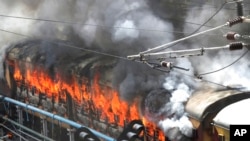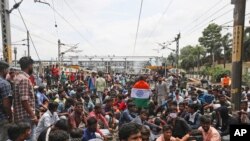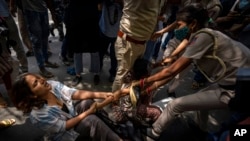Violent protests against a new army recruitment plan in India flared Friday as angry youths set ablaze at least a dozen passenger trains, vandalized government offices, buses and police vehicles and burned tires on highways and blocked them in many states.
This follows protests which erupted across the country Wednesday, a day after Narendra Modi’s Bharatiya Janata Party-led government announced the Agnipath (“Path of Fire” in Hindi) scheme to recruit men and women ages 17-21 for the armed forces on a four-year contract. Until now, new noncommissioned recruits have served for an average of 17 years.
Many of the protesters were young men who aspired to military careers as a path out of poverty. They carried Indian flags and shouted, “Roll back Agnipath. We don’t want short-term jobs. We want permanent jobs.”
The protests rapidly spread Thursday after it was announced that the Agnipath recruitment would begin this month.
Violence reached Uttar Pradesh, Bihar, Rajasthan, Haryana, Uttarkhand, Jharkhand and other states.
The protesters fought pitched battles with security forces in many states and at least one youth was killed when police fired on protesters who set fire to a passenger train in the southern state of Telangana. The protesters were mostly young men across the country, but in New Delhi some women, mostly from the leftist student union, had also joined the protests, demanding a rollback of the recruitment plan.
A middle-aged train passenger died, apparently of a stress-triggered heart attack, after the train was set ablaze by protesters in the eastern state of Bihar.
Short-term recruitment plan
Under the plan, about 46,000 soldiers will be recruited annually, and at the end of the four-year tenure 25% of them will be retained for longer terms, and the rest will be forced to retire, the government announced. Those who lose their jobs after the four-year contract will be offered a lump sum of 1.1 million rupees ($14,100), but unlike other retired armed forces personnel, they will not receive any other pension benefit.
Many youths who are training in hopes of joining the armed forces said that they are disappointed with the scheme. They said that if they join the military, they want to be in the job until they retire and do not want to be jobless again after four years. They are demanding that the government cancel the Agnipath plan and resume recruitment through traditional methods.
With 1.4 million personnel, India’s armed forces is the world’s second-largest, after China. Every year, 50,000-60,000 young men join the forces in search of long-term jobs. With no recruitment in the past two years because of the pandemic, those frustrated jobseekers have launched the protests against the short-term recruitment plan. Women are employed mostly in noncombatant roles, and 3% to 6% of those joining the forces are women.
In many locations, the protesters directed their anger at the federal ruling party, BJP. In Bihar, which has witnessed the most widespread violence in the past two days, protesters vandalized and burned offices of BJP and the homes of senior BJP leaders, including state BJP chief Sanjay Jaiswal.
Protesters threw stones at police, who fired tear gas shells at them. In the Aligarh district of Uttar Pradesh, a BJP-ruled state, protesting youths vandalized and torched a police outpost.
Images aired on television showed that in many places, police, who were far outnumbered by protesters, did not act against the youths and were even chased away by the stone-throwing protesters.
A police officer from Samastipur in Bihar told VOA that the situation was “beyond our control."
“The protesting men are targeting public properties, and they are thousands in number. We are just a few hundred at the most. Their number seems to be swelling,” said the officer, who asked not to be identified because he is a junior officer, not allowed to speak to the media.
Authorities have suspended internet services in Bihar and Haryana to try to curb the spread of protests.
Opposing views
While announcing the Agnipath plan, Defense Minister Rajnath Singh said that it was designed “to strengthen the security of the country.”
“The Agnipath scheme is a truly transformative reform which will enhance the combat potential of the armed forces, with [a] younger profile and technologically adept soldiers,” Singh tweeted.
Opposition leaders, military veterans and even some leaders of Modi’s ruling BJP party said that the plan would lead to more unemployment in the country where joblessness is already a crisis. They have urged the government to review the scheme.
A youth from the Bettiah district in Bihar told VOA that the protesters would not rest until the government rolled back Agnipath.
“For the past three years, I have been training very hard to join the army. But I want a guarantee to be in the job for 20 or 30 years, if I succeed. I never want to be forced to retire after four years and be jobless again,” Pramod Kumar, 20, said.
“Our protest will continue until the government rolls back this short-term recruitment scheme.”






